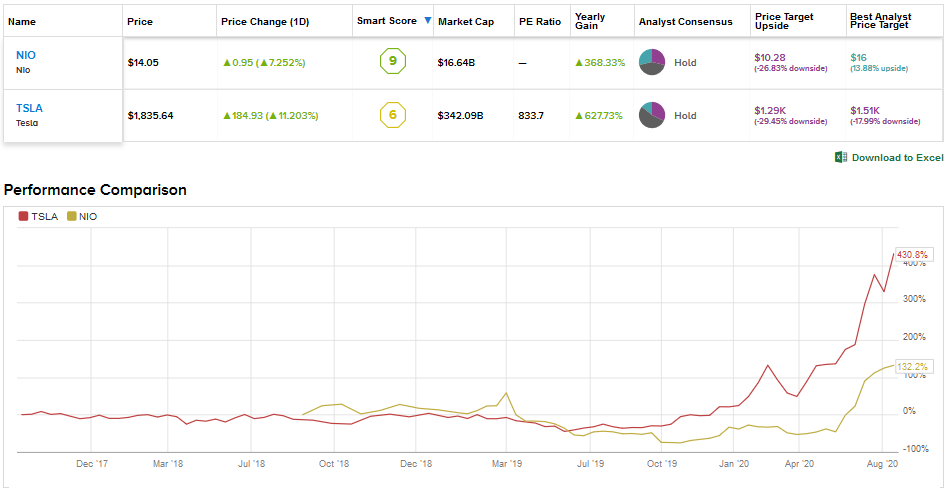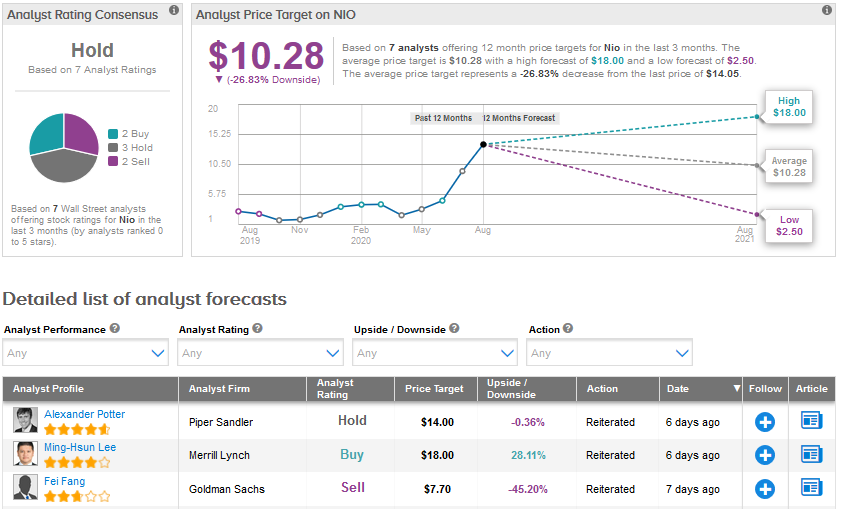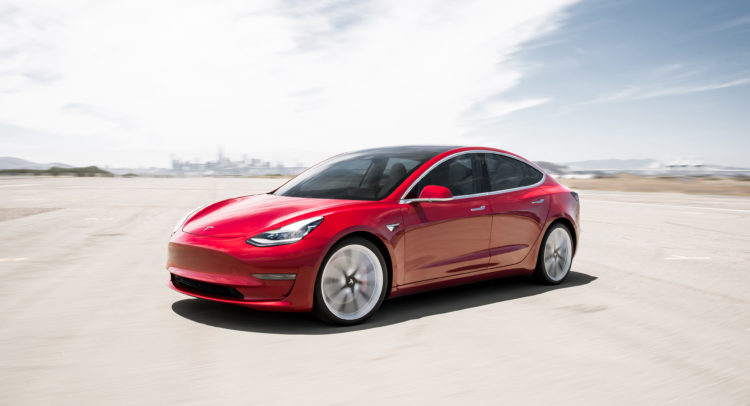The demand for electric vehicles (or EVs) is expected to grow in the long-term even as COVID-19 has currently disrupted the electric vehicle market and the whole automotive industry as well. Several countries are encouraging individuals to transition to electric vehicles to bring down toxic emissions and ensure sustainability.
Cairn Energy Research Advisors estimate that global sales of electric cars will grow 36% in 2021 and will cross 3 million for the first time. Sam Jaffe, the research firm’s managing director, sees demand in China and Europe to be a major growth factor.
Using the TipRanks’ Stock Comparison tool, we will place Tesla—the market leader in the EV space, and China-based NIO alongside each other to see which stock offers the most compelling investment opportunity.

Tesla (TSLA)
Tesla garners a lot of attention from investors, analysts, and media owing to its rapid growth in the electric vehicle market and of course due to its controversial co-founder and CEO Elon Musk. Tesla stock has rallied about 339% year-to-date (as of August 17).
Better-than-anticipated operational performance, a possible addition to the S&P 500, the prospects of development of the next-generation electric car batteries and favorable comments from bullish analysts are some reasons that drove the spectacular rise in the stock.
Tesla’s second-quarter revenue declined 5% Y/Y to $6.04 billion but was way higher than analysts’ expectation of $5.37 billion. The company delivered adjusted EPS of $2.18 and GAAP EPS of $0.50, marking the fourth straight quarter of profitability. Skeptics questioned the company’s profitability and pointed out that it was possible because of the inclusion of higher-than-expected regulatory credits of $428 million.
Regulatory credits or Zero-Emission Vehicles credits are given by state regulators to incentivize the production of electric vehicles. Tesla sells excess credits to other automakers so that they can comply with regulations. Tesla bears feel that the company is depending on such credits to deliver profits. As per Tesla, regulatory credit revenue might double this year compared to 2019 but will reduce over time.
Meanwhile, Tesla’s second-quarter deliveries of 90, 891 were down 4.7% Y/Y amid the pandemic but increased 2.7% compared to the first quarter. Despite the temporary shutdown of the Fremont factory due to COVID-19, the company reaffirmed its target to deliver 500,000 vehicles in 2020.
Meanwhile, Tesla’s Shanghai Gigafactory, launched in 2019, produces the company’s Model 3 vehicles for the customers in China. The company is building further production capacity through its factory in Berlin and the recently announced plant in Austin, Texas.
On August 17 Wedbush analyst Daniel Ives raised his price target for Tesla to $1,900 from $1,800 based on strong demand in China. He stated, “Looking ahead, we believe Musk & Co. are slated to announce a number of new potential ‘game-changing’ battery developments at its highly anticipated Battery Day on Sept. 22.”
The five-star analyst retained his Hold rating and is positive about the company’s price cuts driving further demand. (See TSLA stock analysis on TipRanks)
Four Buys, 15 Holds and 9 Sell ratings for Tesla stock add up to a Hold consensus. After a stellar year-to-date rise, the average price target of $1,295 implies a possible downside of 29.45% in the stock over the next 12 months.

Nio (NIO)
Often touted as the Tesla of China, NIO is considered a pioneer in China’s premium electric vehicle market. The company, which has not yet turned profitable, was in the negative light in recent times due to its high cash burn rate and last year’s product recalls.
However, the financial crisis was addressed with a cash infusion from strategic partners and $428 million raised through an ADR or American Depositary receipt offering.
Nio reported better than anticipated second-quarter results. The company’s $0.16 loss per American Depositary Share (adjusted loss of $0.15) was lower than analysts’ loss estimate of $0.26. The second-quarter revenue of $526.4 million exceeded analysts’ forecast of $504 million. In terms of its local currency, the company’s revenue grew 146.5% to 3.72 billion yuan.
The company delivered 10,331 ES6 and ES8 vehicles, a Y/Y jump of 191%. Nio also provided a strong Q3 guidance with estimated deliveries between 11,000 to 11,500 vehicles.
Nio also pleased investors by posting a gross margin of 8.4% compared to -33.4% in the prior year’s second quarter. Strong sales, lower material costs and improved manufacturing efficiency helped Nio deliver its first-ever positive gross margin. The quarter also marked the first instance of a positive operating cash flow for the company.
Now Nio is focusing on ramping up production to meet higher demand and commence deliveries of its third vehicle, the EC6—a luxury crossover SUV, in September.
So far Nio stock has advanced about 250% year-to-date as of August 17. However, an average 12-month price target of $10.28 indicates a downside of 26.83% in the stock. The Street’s Hold consensus for Nio stock is based on 2 Buys, 3 Holds, and 2 Sells.
Following the results, Piper Sandler analyst Alexander Potter increased his price target for Nio to $14 from $4 but maintained his Hold rating. In a research note, he stated “NIO arguably relies too much on partners for core capabilities (especially self-driving systems, batteries, and vehicle manufacturing), but the company may attempt to internalize these functions over time.” (See NIO stock analysis on TipRanks)

Tesla or Nio – the better choice?
The rising competition in the electric vehicles space from giants like Ford and General Motors and start-ups like Nikola is a matter of concern. Also, Tesla’s high valuation makes it risky and has been a topic of debate. However, the company’s technology and a diversified business model, which includes its solar energy business, give it a competitive edge.
Both Tesla and Nio stocks have skyrocketed this year and the Street’s average price targets do not indicate further upside. However, a more diversified business and better growth prospects appear to make Tesla a better long-term choice in the EV space compared to Nio.
To find good ideas for stocks trading at attractive valuations, visit TipRanks’ Best Stocks to Buy, a newly launched tool that unites all of TipRanks’ equity insights.
Disclaimer: The opinions expressed in this article are solely those of the featured analysts. The content is intended to be used for informational purposes only. It is very important to do your own analysis before making any investment
















